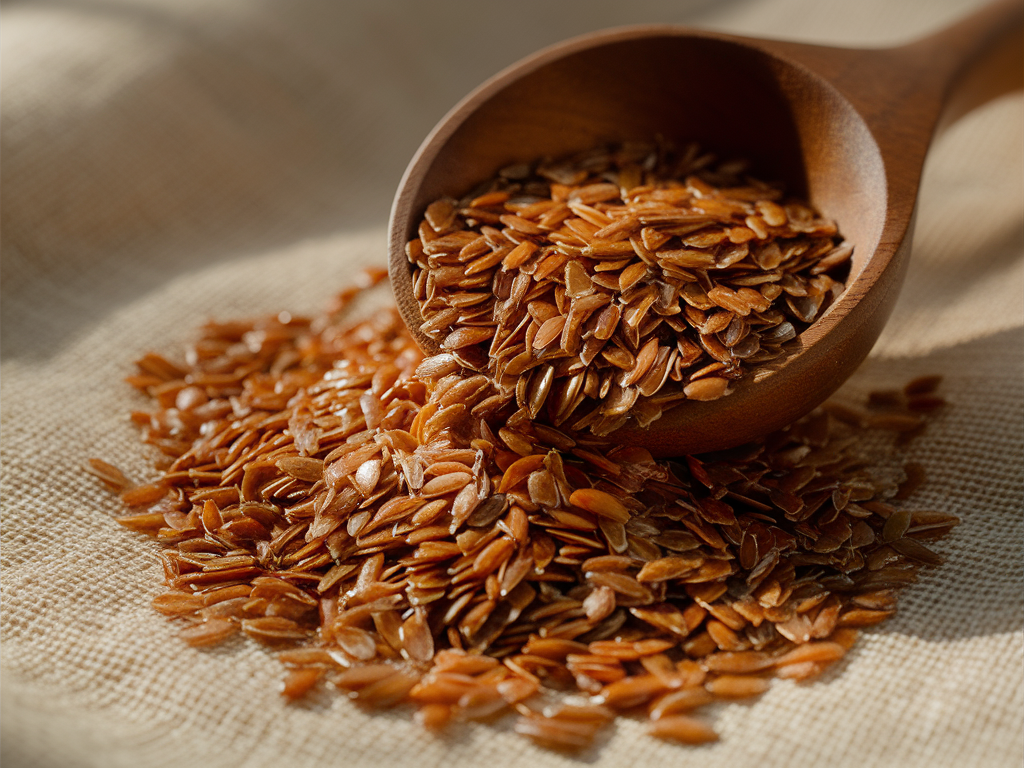Flax seeds have been revered for thousands of years, dating back to ancient civilizations where they were prized for both their nutritional and medicinal properties. These tiny powerhouses represent one of nature’s most concentrated sources of essential nutrients and bioactive compounds. Today, modern science has validated what traditional healers have known for centuries – flax seeds deliver an impressive array of health benefits that can positively impact virtually every system in the human body. In this comprehensive guide, we’ll explore twelve evidence-backed ways these remarkable seeds can enhance your wellbeing, from supporting cardiovascular function to improving digestive health and beyond.

Nutritional Profile of Flax Seeds
Before diving into the specific health benefits, understanding the exceptional nutritional composition of flax seeds helps explain why they’re considered a true superfood. These small brown or golden seeds pack a remarkable nutritional punch:
Omega-3 Fatty Acids
Flax seeds stand as the richest plant source of alpha-linolenic acid (ALA), an essential omega-3 fatty acid that the body partially converts to EPA and DHA – the same beneficial compounds found in fatty fish. Just one tablespoon provides approximately 1.8 grams of ALA, exceeding the daily recommended intake for most adults.
Fiber Powerhouse
With about 3 grams of fiber per tablespoon, flax seeds contain both soluble and insoluble fiber. The soluble fiber forms a gel-like substance that slows digestion and helps regulate blood sugar, while insoluble fiber adds bulk to stool, promoting regularity and digestive health.
Quality Protein Source
Flax seeds contain approximately 1.3 grams of protein per tablespoon, providing essential amino acids that serve as building blocks for cellular repair and maintenance throughout the body.
Vitamin and Mineral Content
These nutritional gems contain significant amounts of vitamin E, B vitamins (particularly thiamine), and minerals including magnesium, phosphorus, copper, manganese, and selenium – all critical cofactors for hundreds of enzymatic reactions in the body.
Lignans and Phytochemicals
Perhaps most impressively, flax seeds contain up to 800 times more lignans (plant compounds with estrogen-like properties) than other plant foods. The primary lignan in flax, secoisolariciresinol diglucoside (SDG), has demonstrated powerful antioxidant, anti-inflammatory, and hormone-balancing effects.
The 12 Health Benefits of Flax Seeds
1. Heart Health Promotion
The cardiovascular benefits of flax seeds are among their most well-documented effects. Regular consumption has been shown to:
- Reduce Blood Pressure: Multiple clinical studies demonstrate that daily flax seed consumption can lower both systolic and diastolic blood pressure. One landmark study published in Hypertension found that 30 grams of flaxseed daily for six months reduced systolic blood pressure by an average of 10 mmHg and diastolic pressure by 7 mmHg in patients with hypertension – comparable to some prescription medications.
- Lower Cholesterol Levels: The soluble fiber in flax seeds binds to cholesterol in the digestive tract, preventing its absorption and facilitating its excretion. Research shows consistent consumption can reduce LDL (“bad”) cholesterol by up to 20%.
- Provide Anti-inflammatory Protection: The omega-3 fatty acids in flax seeds help decrease the production of inflammatory compounds like cytokines and eicosanoids that can damage blood vessel walls and promote atherosclerosis.
2. Digestive Health Improvement
Flax seeds offer multifaceted support for the digestive system:
- Enhanced Digestive Regularity: The combination of soluble and insoluble fiber makes flax seeds particularly effective at normalizing bowel movements, whether you struggle with constipation or occasional loose stools.
- Constipation Prevention: When ground flax seeds come in contact with water, they form a mucilaginous gel that acts as a natural, gentle laxative, increasing stool frequency and improving consistency without the harsh effects of commercial laxatives.
- Prebiotic Benefits: The fiber in flax functions as a prebiotic, feeding beneficial gut bacteria like Bifidobacteria and Lactobacillus. These microbes produce short-chain fatty acids that nourish colon cells and strengthen gut barrier integrity.
3. Blood Sugar Regulation
For those concerned about maintaining healthy blood glucose levels, flax seeds offer significant benefits:
- Improved Insulin Sensitivity: The lignans and fiber in flax seeds appear to enhance cellular response to insulin, allowing for more efficient glucose uptake from the bloodstream.
- Glycemic Control: The gel-forming properties of flax’s soluble fiber slow carbohydrate digestion and absorption, blunting post-meal blood sugar spikes. One study found that adding 10 grams of flaxseed powder to a meal reduced post-prandial blood glucose levels by up to 28%.
- Diabetes Management: Research published in Nutrition Research showed that type 2 diabetics who consumed 10g of flaxseed powder daily for one month experienced a 19.7% reduction in fasting blood sugar compared to controls.
4. Cancer Risk Reduction
The anti-cancer potential of flax seeds has generated substantial scientific interest:
- Hormone-Dependent Cancer Protection: The lignans in flax seeds can bind to estrogen receptors, potentially inhibiting the growth of hormone-sensitive tumors. Observational studies suggest regular consumption is associated with reduced risk of breast, prostate, and other hormone-dependent cancers.
- Antioxidant Defense: Flax seeds contain numerous compounds that neutralize free radicals and reduce oxidative damage to DNA – a critical factor in cancer initiation and progression.
- Research-Backed Benefits: A meta-analysis published in Integrative Cancer Therapies found that flaxseed consumption was associated with a 20% reduction in breast cancer risk. Similar protective effects have been observed for colorectal and prostate cancers in multiple population studies.

5. Weight Management Support
For those seeking to maintain a healthy weight, flax seeds offer several advantages:
- Appetite Regulation: The combination of protein, healthy fats, and fiber in flax seeds helps promote feelings of fullness, reducing the likelihood of overeating at subsequent meals.
- Metabolic Enhancement: Some research suggests the ALA in flax seeds may boost metabolic rate and fat oxidation, potentially increasing calorie expenditure.
- Extended Satiety: The soluble fiber in flax expands in the stomach and slows gastric emptying, extending the feeling of satisfaction after eating. A study in Appetite journal found that adding 2.5 grams of flaxseed fiber to a beverage increased feelings of fullness and reduced hunger compared to a control drink.
6. Skin Health Enhancement
The benefits of flax seeds extend to your body’s largest organ:
- Skin Barrier Reinforcement: The essential fatty acids in flax seeds are incorporated into cell membranes, strengthening the skin’s moisture barrier and reducing transepidermal water loss.
- Anti-inflammatory Action: For those with inflammatory skin conditions like eczema, psoriasis, or acne, the omega-3 content and antioxidants in flax seeds may help reduce redness, irritation, and inflammatory lesions.
- Improved Elasticity and Hydration: Regular consumption of flax seeds provides the building blocks for collagen and elastin synthesis, potentially improving skin elasticity, hydration, and overall appearance.
7. Anti-Inflammatory Properties
Chronic inflammation underlies many modern diseases, making the anti-inflammatory effects of flax seeds particularly valuable:
- Inflammatory Marker Reduction: Regular flaxseed consumption has been shown to reduce levels of inflammatory markers like C-reactive protein (CRP), interleukin-6, and tumor necrosis factor-alpha.
- Inflammatory Condition Relief: Studies suggest flax seed supplementation may help ameliorate symptoms in conditions like rheumatoid arthritis, asthma, and inflammatory bowel diseases by modulating inflammatory pathways.
- Comparative Potency: While not as potent as fish oil for inflammation reduction, flax seeds represent the most concentrated plant source of anti-inflammatory omega-3s, making them particularly valuable for vegetarians and those who avoid fish.
8. Hormone Balance
The unique phytochemical profile of flax seeds makes them valuable for hormonal health:
- Phytoestrogen Activity: Flax lignans can weakly bind to estrogen receptors, exerting adaptogenic effects – meaning they can increase estrogen activity when levels are low and decrease it when levels are excessive.
- Menopausal Symptom Relief: Multiple clinical trials have demonstrated that regular flaxseed consumption can reduce the frequency and severity of hot flashes, night sweats, and mood swings during perimenopause and menopause.
- Menstrual Regularity: For premenopausal women, the hormone-balancing effects of flax seeds may help normalize menstrual cycles and reduce symptoms of PMS.
9. Brain Health and Cognitive Function
Emerging research points to significant neurological benefits from flax seeds:
- Brain Structure Support: The omega-3 fatty acids in flax seeds are essential structural components of neural cell membranes and myelin sheaths that insulate nerve fibers, facilitating optimal brain function.
- Neuroprotective Effects: Animal studies suggest that compounds in flax seeds may help protect neurons against oxidative damage and reduce the deposition of beta-amyloid plaques associated with Alzheimer’s disease.
- Cognitive Performance: Observational studies have linked higher dietary intake of ALA from sources like flax seeds with better cognitive performance and reduced rates of age-related cognitive decline.
10. Immune System Support
A well-functioning immune system relies on optimal nutrition, which flax seeds help provide:
- Micronutrient Support: The zinc, selenium, copper, and B vitamins in flax seeds play crucial roles in immune cell production, signaling, and function.
- Antimicrobial Properties: Certain compounds in flax seeds have demonstrated antimicrobial activity against pathogens, potentially enhancing the body’s defense against bacterial and fungal infections.
- Immune Modulation: Rather than simply boosting immunity (which can be problematic in autoimmune conditions), flax seeds help modulate immune function, potentially bringing overactive or underactive immune responses back into balance.
11. Bone Health Improvement
Maintaining strong, healthy bones involves more than just calcium, and flax seeds offer comprehensive skeletal support:
- Mineral Density Support: Flax seeds contain a notable amount of magnesium, phosphorus, and calcium – all essential minerals for bone matrix formation and maintenance.
- ALA Benefits: Research suggests that the ALA in flax seeds may help inhibit osteoclasts (cells that break down bone) while supporting osteoblasts (bone-building cells), potentially improving bone turnover and density.
- Osteoporosis Prevention: The estrogenic effects of flax lignans may be particularly beneficial for postmenopausal women at increased risk of osteoporosis due to declining estrogen levels. Several studies have shown associations between flaxseed consumption and reduced markers of bone resorption.
12. Detoxification Support
In our modern world of environmental toxins, flax seeds offer valuable detoxification assistance:
- Toxin Binding: The soluble fiber in flax seeds can bind to heavy metals, pesticide residues, and other environmental toxins in the digestive tract, facilitating their elimination and reducing reabsorption.
- Liver Function Support: Compounds in flax seeds have been shown to increase levels of glutathione – the body’s master antioxidant and a crucial component of the liver’s detoxification pathways.
- Enhanced Elimination: By promoting regular bowel movements, flax seeds help ensure the efficient elimination of toxins processed by the liver, preventing their recirculation in the body.

How to Incorporate Flax Seeds Into Your Diet
To maximize the health benefits of flax seeds, consider these practical guidelines:
Ground vs. Whole Seeds
Always opt for ground flax seeds or grind them yourself in a coffee or spice grinder before consumption. The hard outer shell of whole flax seeds is extremely difficult for humans to digest, meaning whole seeds will likely pass through your system undigested, preventing the absorption of their beneficial nutrients.
Recommended Daily Intake
Most health authorities suggest consuming 1-2 tablespoons (10-20 grams) of ground flax seeds daily to experience their health benefits. Begin with smaller amounts (1 teaspoon) and gradually increase to allow your digestive system to adapt to the additional fiber.
Storage Recommendations
Due to their high polyunsaturated fat content, ground flax seeds are susceptible to oxidation and rancidity. Store whole seeds in an airtight container at room temperature for up to a year. For ground flax, store in an opaque, airtight container in the refrigerator for up to 3 months or in the freezer for up to 6 months to preserve freshness and nutritional quality.
5 Easy Ways to Add Flax Seeds to Your Diet
- Smoothie Addition: Add 1-2 tablespoons of ground flax seeds to your morning smoothie for a nutrient boost that won’t affect the flavor profile. The seeds blend seamlessly with fruits and vegetables.
- Baking Incorporation: Replace up to 1/4 cup of flour with ground flax in bread, muffin, and cookie recipes. This adds nutrition while creating a pleasant nutty flavor and moist texture.
- Yogurt or Oatmeal Topping: Sprinkle 1-2 teaspoons of ground flax seeds over yogurt, oatmeal, or overnight oats for added texture and nutritional value.
- Salad Sprinkle: Add a tablespoon of ground flax seeds to salad dressings or sprinkle directly onto salads for a subtle nutty flavor and omega-3 boost.
- Egg Substitute: Create a “flax egg” by combining 1 tablespoon ground flax seeds with 3 tablespoons water and allowing the mixture to thicken for 5-10 minutes. This works well as a binding agent in vegan recipes, replacing one egg in most baking applications.
Potential Side Effects and Precautions
While flax seeds are generally safe for most people, there are some considerations to keep in mind:
Digestive Discomfort
Introducing too much flax too quickly can cause bloating, gas, and abdominal discomfort due to their high fiber content. Start with small amounts and gradually increase while ensuring adequate water intake to minimize these effects.
Medication Interactions
Flax seeds may interact with certain medications by affecting their absorption or activity:
- Blood-thinning medications (e.g., warfarin) – The omega-3s in flax can enhance their effects
- Diabetes medications – Flax may further lower blood sugar levels
- Hormone-sensitive medications or conditions – The phytoestrogens in flax could potentially interact
Always consult with a healthcare provider before adding significant amounts of flax seeds to your diet if you’re taking prescription medications.
Populations Who Should Exercise Caution
Certain groups should be particularly mindful when consuming flax seeds:
- Pregnant women – Some research suggests that the hormonal effects of flax seeds could potentially affect pregnancy, though moderate consumption is generally considered safe
- People with hormone-sensitive cancers – Consult with an oncologist before regular consumption
- Those with bleeding disorders – The omega-3s in flax seeds may increase bleeding risk
- Individuals with intestinal blockages – The fiber in flax could potentially worsen the condition
Conclusion
Flax seeds represent one of nature’s most impressive nutritional packages, offering a remarkable range of health benefits supported by substantial scientific evidence. From heart health and digestion to hormonal balance and cognitive function, these tiny seeds deliver powerful biological effects that can significantly enhance overall health and wellbeing.
As with any nutritional powerhouse, consistency is key. The most significant benefits come from regular, moderate consumption as part of a varied, plant-rich diet. Whether sprinkled on oatmeal, blended into smoothies, or incorporated into baking, making flax seeds a daily habit may be one of the simplest yet most impactful dietary changes you can implement for long-term health.
Remember that while flax seeds offer impressive benefits, they work best as part of a holistic approach to wellness that includes regular physical activity, stress management, adequate sleep, and a diverse diet rich in other whole plant foods. With their exceptional nutritional profile and versatility in the kitchen, flax seeds truly earn their status as one of nature’s premier superfoods.

